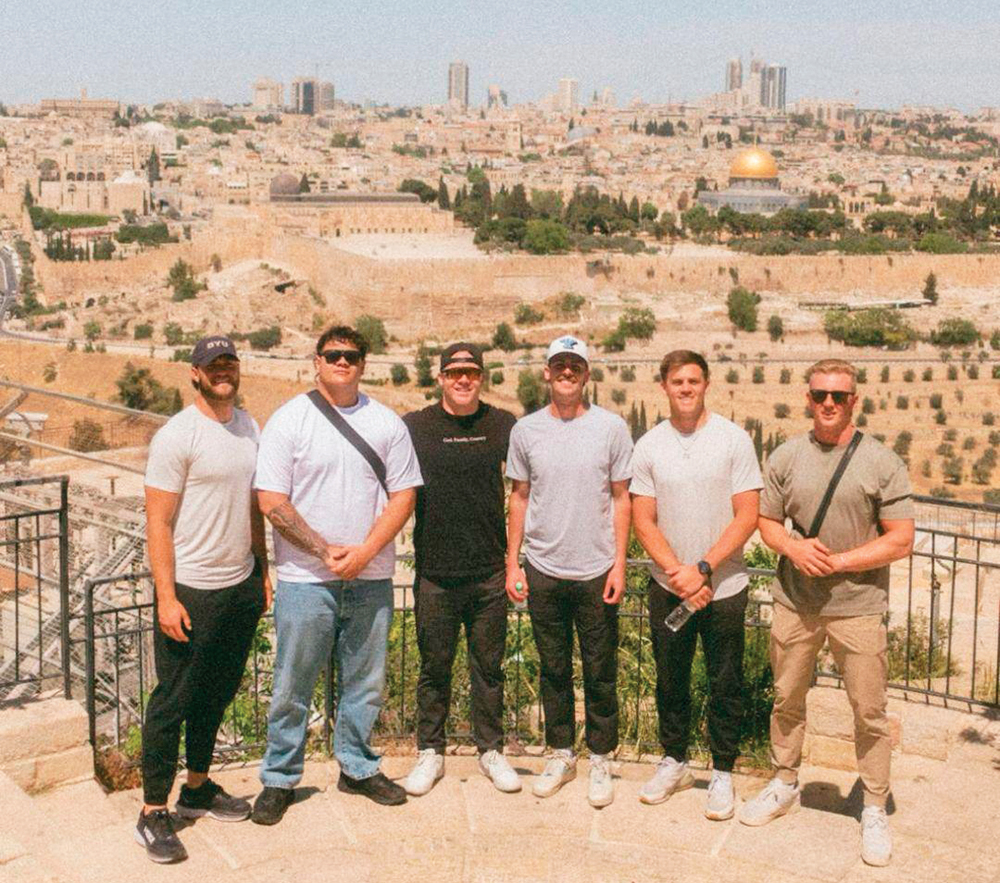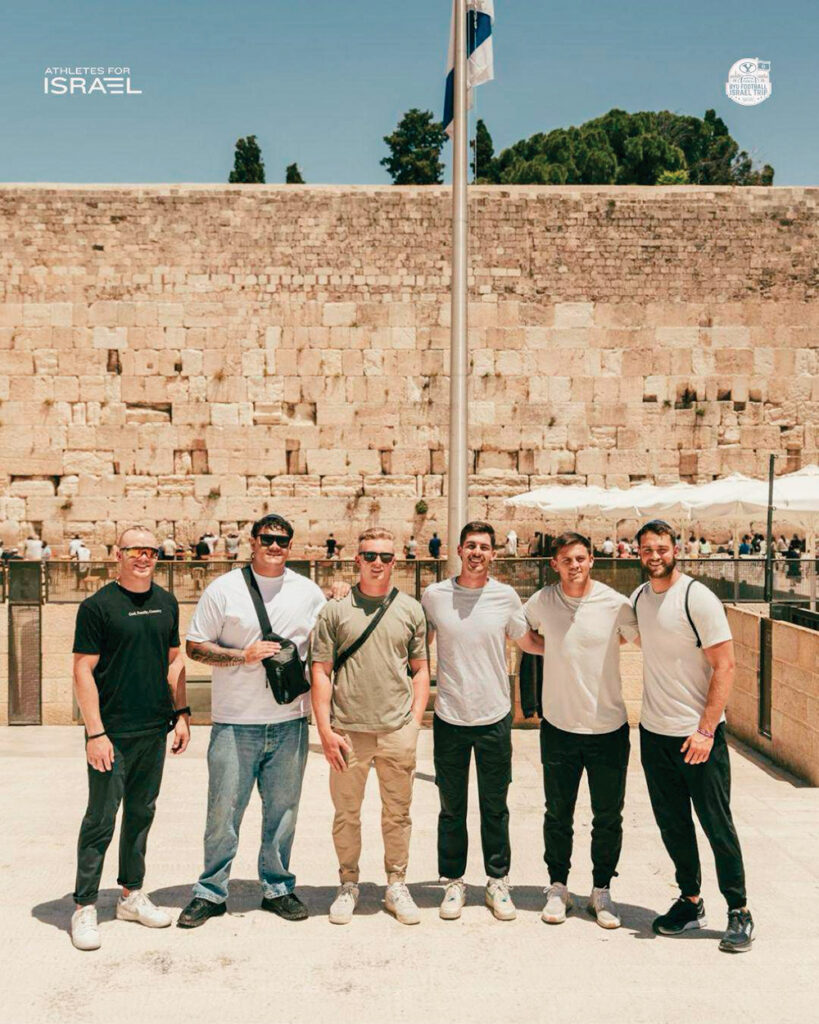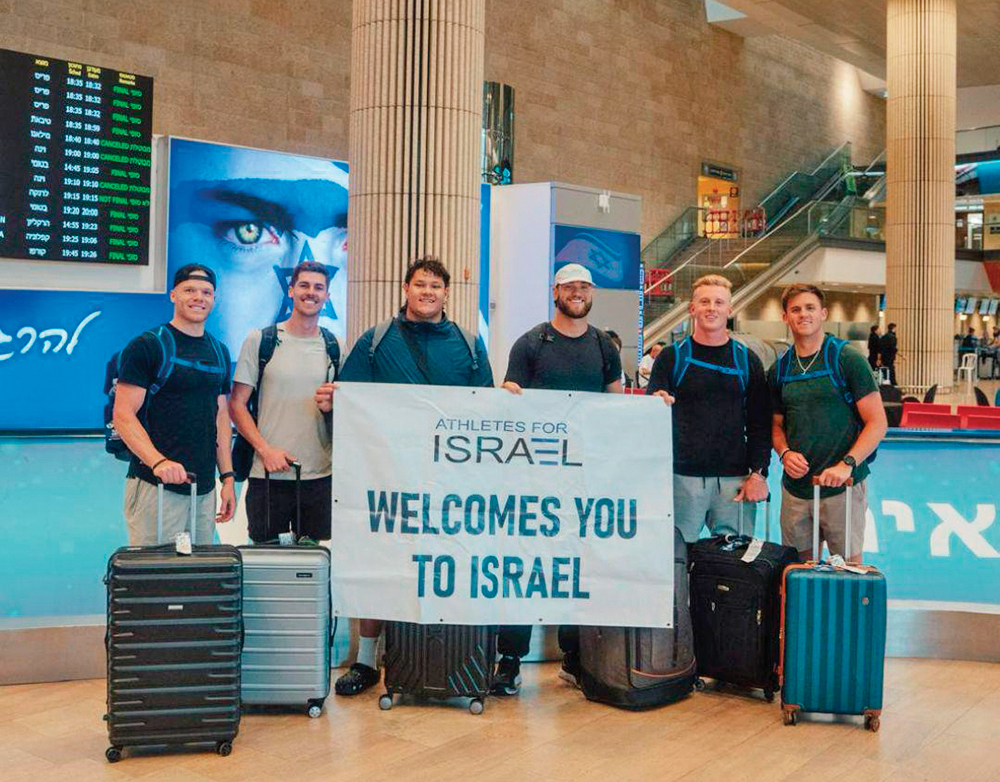
In a world increasingly shaped by social media influence, polarized discourse and public opinion, one organization is using an unexpected yet profoundly powerful tool to combat antisemitism and reframe public perception of Israel: athletics.
Athletes for Israel was founded six years ago with a bold mission — to leverage the global reach of professional and collegiate athletes to promote a deeper understanding of Israel and challenge rising antisemitism and misinformation. By organizing transformative trips to Israel, the organization provides professional athletes from the NBA, NFL, MLB, Division 1 college teams, and more with an up close and personal experience of the country’s history, diversity and complexity, an experience they are then inspired to share with millions of followers around the world. As Athletes for Israel founder Daniel Posner shared, “The goal is that by using their platform, these athletes can reach hundreds of millions of people who are uneducated about Israel and shine a positive light on it.”

For many non-Jewish individuals, “The only way to understand Israel is to visit it and see it for yourself,” said Posner. “I could tell you until I’m blue in the face that Israel is a diverse country, that 20% of Israelis are not even Jewish, that 60% of Israelis are from the Middle Eastern countries like Iraq, Iran or Egypt. But until you see it for yourself, until you see the freedom of religion, until you see the melting pot that Israel is, until you see the people and meet the people and have a real cultural exchange, it’s really hard to describe and to really internalize.”
With the mission of conveying this information to athletes and, by extension, to the world, Athletes for Israel began bringing professional players and college teams to Israel.
AFI began bringing college athletes to Israel when Posner was introduced to Bruce Pearl, Auburn University’s head basketball coach. As Posner told the story, “He’s a big Israel advocate, and he said to me, ‘Daniel, I have this dream, I want to bring my team to Israel.’ I said, ‘Coach, we’re gonna help your dream become a reality.’ Six months later, we brought the entire team to Israel, along with ESPN, which brought an entire camera crew. All of the games that they played in Israel against Israeli teams were televised on ESPN, reaching millions of people.” As Pearl shared after his experience, “We are a misunderstood people, Israel is a misunderstood land, and the best way that we can increase our understanding of it is to come visit. The experience speaks for itself.”
The following year, AFI brought the basketball teams of University of Arizona and Kansas State University to Israel. Since Oct. 7, volunteer missions have been set into motion. Most recently, Athletes for Israel traveled with a delegation of Brigham Young University (BYU) football co-captains. BYU has a population that is 97% Mormon/LDS, and most of its students know very little about Judaism, antisemitism and Israel. BYU’s football team is one of the top 15 football teams in the country, and some of its players will be moving on to the NFL in the coming years.

These athletes traveled with AFI on a one-week trip to Israel in early May. The trip was divided into three sections. First, religious and historical exploration: the delegation visited the Church of the Holy Sepulcher, the Western Wall, the City of David, and more. Second, cultural exchange: for example, volunteering and service in underprivileged communities. Third, Israeli society in a post-Oct. 7 world: Kibbutz Be’eri and the Nova Festival site, for example. A particular highlight of the trip was Friday night dinner in Jerusalem; the athletes had the opportunity to experience Jewish culture and traditions and compare them with their own connections to their religion and faith.
“The idea behind each one of these trips,” Posner articulated, “is not just to impact each one of the participants, but also for them to use their platform to advocate and spread the knowledge they’ve gained about Israel, what it is and what it isn’t.” At the end of the week, the delegates attend a debriefing dinner, replaying the events and experiences of the trip. The crucial question is as follows: What are you going to take back with you?
For one athlete, the lesson was clear: “I came to Israel not knowing anything. I’m coming back understanding the story of Israel and how misunderstood it is, and why, since Oct. 7, Israel has to fight a war even though they don’t want to fight in wars. They have to protect their citizens. They’re fighting against the terrorist organization called Hamas, which is committing horrible atrocities, and we need to support Israel.”

Before and after each trip, the delegates complete a survey regarding their knowledge on Israel and antisemitism and their experiences; “All of them give enormously high praise and excitement about being involved and excited about telling their stories,” according to Posner. “I think they feel more conviction in their religion. I think they feel more conviction in terms of their support and interest in supporting Israel.” These experiences are not easy to forget, and the hope is that these athletes will bring the emotions associated with the experience back home with them. This feedback makes the entire trip worthwhile, as Posner shared, “We have a real return on our investment. We invest in them so that we can reach a broader community.”
Athletes for Israel, originally inspired by Robert Kraft and AIPAC, believes that social media has a massive impact on public opinion. “If we’re going to invest in combating antisemitism, we need to bring people who have platforms to Israel … we need more people to come and see it with their own eyes.” Posner saw the work being done to turn the tide and said, “We need to do more of this, not just in the political realm.” Sports and entertainment truly are the social fabric of the U.S., and the online platforms of athletes and artists have a substantial influence on politics, especially among Millennials and Gen Z. “We need to make sure that popular culture is with Israel. The one way to do that is by bringing sports stars, athletes and influencers to Israel to help them understand and educate them so that they can educate others,” added Posner.
In its six years, and especially in the aftermath of Oct. 7, Athletes for Israel has reached tens of millions of people. In Posner’s view, “If we reach only the Jewish community, we’ve failed. Our goal is to reach a spectrum of people, which is not the 10% of the people that are with us, not the 10% of the people that hate us or hate Israel. It’s the 80% of the people in the middle who aren’t educated and don’t want to be involved. Sports is the way to connect with them and get them invested.”
As AFI’s mission statement details, “we can together change the narrative and combat antisemitism.” To learn more about Athletes for Israel, visit athletesforisrael.org.
Eliana Birman is the assistant digital editor for The Jewish Link. She is a rising sophomore at Barnard College and lives in Teaneck.








